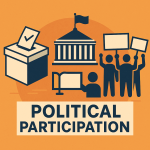Politics and Its Role in Shaping Society
Politics is not just about elections and political parties; it is the foundation of how a society is governed and how decisions are made that affect every citizen. From local governance to international relations, politics plays a critical role in shaping the present and future of our society. In today’s fast-paced and information-driven world, understanding politics is no longer a choice—it’s a necessity.
The Core of Politics: Governance and Representation
At its core, politics is about governance—about how decisions are made, who makes them, and for whom. In democratic societies, politics is the tool through which people elect leaders who represent their interests. This representative system ensures that governance is not a top-down autocracy but a participative structure where the voices of citizens matter.
Through politics, policies are created that influence everything from education, healthcare, and employment to national security and foreign policy. Without political structures, there would be no organized method to allocate resources, ensure justice, or maintain law and order.
Politics as a Driver of Social Change
Politics is often a mirror of society—it reflects its values, conflicts, and aspirations. But more than that, politics can drive social change. History is full of political movements that have transformed societies: the civil rights movement in the USA, the anti-apartheid struggle in South Africa, or India's independence movement. These changes weren’t just moral or cultural—they were deeply political.
Even today, politics influences issues like gender equality, climate change, freedom of expression, and social justice. When people engage in politics—whether through voting, activism, or public debates—they become agents of change. Politics gives the people a platform to raise their voices and challenge injustice.
The Challenges in Modern Politics
Despite its importance, modern politics faces several challenges. One major issue is the rise of polarization—where societies are deeply divided based on political ideologies. This can reduce cooperation and lead to gridlock in decision-making.
Another concern is the influence of money and media. Political campaigns require significant funding, and media narratives often shape public opinion in biased ways. This reduces transparency and makes it difficult for common citizens to trust political processes.
Moreover, in many countries, political participation is declining. Youth often feel disconnected from politics, seeing it as corrupt or untrustworthy. However, it is precisely the youth that can bring in fresh ideas and energy into political systems.
Why Understanding Politics Matters
Every citizen is affected by politics, whether they realize it or not. The price of fuel, the quality of roads, the funding for your college—all of these are political decisions. Understanding how political systems work empowers people to make informed choices, hold leaders accountable, and contribute meaningfully to democracy.
In a time when misinformation spreads fast, being politically aware also helps individuals separate facts from propaganda. An educated and politically conscious public is the strongest pil
lar of a healthy democracy.
Politics is not just about elections and political parties; it is the foundation of how a society is governed and how decisions are made that affect every citizen. From local governance to international relations, politics plays a critical role in shaping the present and future of our society. In today’s fast-paced and information-driven world, understanding politics is no longer a choice—it’s a necessity.
The Core of Politics: Governance and Representation
At its core, politics is about governance—about how decisions are made, who makes them, and for whom. In democratic societies, politics is the tool through which people elect leaders who represent their interests. This representative system ensures that governance is not a top-down autocracy but a participative structure where the voices of citizens matter.
Through politics, policies are created that influence everything from education, healthcare, and employment to national security and foreign policy. Without political structures, there would be no organized method to allocate resources, ensure justice, or maintain law and order.
Politics as a Driver of Social Change
Politics is often a mirror of society—it reflects its values, conflicts, and aspirations. But more than that, politics can drive social change. History is full of political movements that have transformed societies: the civil rights movement in the USA, the anti-apartheid struggle in South Africa, or India's independence movement. These changes weren’t just moral or cultural—they were deeply political.
Even today, politics influences issues like gender equality, climate change, freedom of expression, and social justice. When people engage in politics—whether through voting, activism, or public debates—they become agents of change. Politics gives the people a platform to raise their voices and challenge injustice.
The Challenges in Modern Politics
Despite its importance, modern politics faces several challenges. One major issue is the rise of polarization—where societies are deeply divided based on political ideologies. This can reduce cooperation and lead to gridlock in decision-making.
Another concern is the influence of money and media. Political campaigns require significant funding, and media narratives often shape public opinion in biased ways. This reduces transparency and makes it difficult for common citizens to trust political processes.
Moreover, in many countries, political participation is declining. Youth often feel disconnected from politics, seeing it as corrupt or untrustworthy. However, it is precisely the youth that can bring in fresh ideas and energy into political systems.
Why Understanding Politics Matters
Every citizen is affected by politics, whether they realize it or not. The price of fuel, the quality of roads, the funding for your college—all of these are political decisions. Understanding how political systems work empowers people to make informed choices, hold leaders accountable, and contribute meaningfully to democracy.
In a time when misinformation spreads fast, being politically aware also helps individuals separate facts from propaganda. An educated and politically conscious public is the strongest pil
lar of a healthy democracy.

